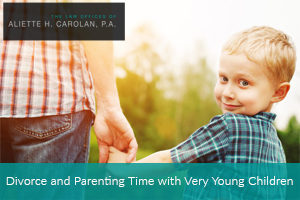 In all cases involving underage children, parenting time and child support are addressed by the courts. When the parties can agree, the lawyers reduce the agreements to writing and file them with the court. When parties can’t agree, the court decides these critical issues. While child support is fairly predictable under Florida law, parenting time, or timesharing, can vary, depending on the judge. Consequently, it is a good idea for parents to come to agreement about timesharing when possible. At the Law Offices of Aliette H. Carolan, P.A., we are cognizant of the pitfalls of a poorly thought out timesharing plan. Below are some considerations when divorcing withchildren ages 0 – 3.
In all cases involving underage children, parenting time and child support are addressed by the courts. When the parties can agree, the lawyers reduce the agreements to writing and file them with the court. When parties can’t agree, the court decides these critical issues. While child support is fairly predictable under Florida law, parenting time, or timesharing, can vary, depending on the judge. Consequently, it is a good idea for parents to come to agreement about timesharing when possible. At the Law Offices of Aliette H. Carolan, P.A., we are cognizant of the pitfalls of a poorly thought out timesharing plan. Below are some considerations when divorcing withchildren ages 0 – 3.
Make Contact with Both Parents a Priority
Sadly, on average 1/3rd of all children whose parents are separated or divorced lose contact with one of their parents. However, studies show children who have two involved parents have better long-term outcomes, including:
- Greater overall school performance;
- Higher cognitive skills;
- Greater emotional and social functioning;
- Less behavioral problems; and
- Greater financial security.
Stay Connected Even When the Other Parent Has the Child
Even when the other parent has the child, the non-custodial parent can take steps to be involved. Both parents should, when they have the opportunity to do so, engage in some or all the following activities to continue to build and maintain their bond with their children:
- Attend appointments with physicians, dentists, therapists, and other caregivers;
- Participate in play groups;
- Attend preschool activities;
- Drop the child off and pick the child up from school, even when taking them to the other parent’s home for the evening;
- Offering support to the parent who has timesharing, where appropriate;
- Making sure to take advantage of all timesharing opportunities, rather than skipping planned parenting time; and
- When missing a timesharing opportunity is unavoidable, giving the other person as much advance notice as possible, along with proposed make up time.
Prepare the Child with Talk of the Transition
When parents switch timesharing, consider preparing the child ahead of time. Establish a routine that includes verbal reminders both that they are going to go to the other parent, and that they are going to have an enjoyable time. Even small children understand works and recognize tone. Put on a positive spin. Pack a favorite comfort item, such as a blanket or stuffed toy for self-soothing, if they need it.
Hang in There
Studies show that by the age of four, children who have two homes safe and familiar to them generally show few if any signs of negative outcomes while having multiple overnights and lots of timesharing between parents.
If You Are Considering Divorce and Have Young Children
If you are considering divorce and have young children, your timesharing plan may look nothing like the timesharing plan of your friend with older children. Special consideration must be given to your child’s tender age. While there are “best practices” the community agrees on, they may not be best for your young children. Consequently, it is a good idea to connect with an experienced family law attorney to discuss options and plans that suit your individual family needs. Contact the Law Office of Aliette H. Carolan, P.A., for a consultation at (305) 358-2330.
